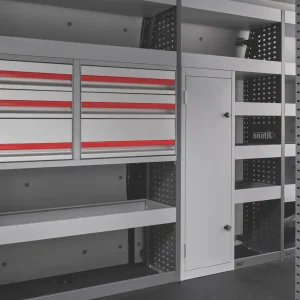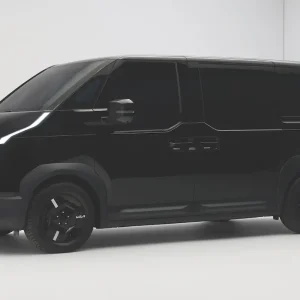The least van-like van ever to be handed a What Van? Award, the Twizy Cargo is a one- seat electric vehicle that maybe shares more in common with a mobility scooter than a Movano.
But it’s fair to say, nothing that has passed through the car park of What Van? or sister publication BusinessCar created anything like the stir that accompanied the Renault when we tested it. It certainly doesn’t go under the radar, and even if the responses aren’t universally positive, it’s a vehicle everyone wants to know about.
The Cargo version of Renault’s regular two-seat Twizy swaps the second in-line seat for a 0.18m3 lockable load area that will take a 75kg payload and is accessed via a door that opens sideways to 90 degrees. The cargo area is at least more secure than the cabin, which is accessed via scissor doors that pull upwards rather than out, though those themselves are a £545 option and only offer a strip of protection around the middle third of the door.
The Cargo costs £6242, plus monthly battery leasing charges that range from £30-£75, depending on mileage and term of contract.
It’s powered by a 13KW battery that equates to 17hp, plenty around town with the instant surge that comes with electric power. Maximum speed is given at 50mph, incline-dependent, and that’s ample for such an urban-centric vehicle that’s not likely to stray far from the relative comfort of 30mph limits.
That town-based existence, or even deployment in large depot situations, means the real-world range of around 50 miles will be fine. Charging is either via regular three-pin or electric vehicle charging point, with a full charge achieved in three-and-a-half hours.
The cabin is, it’s fair to say, sparse, though it is necessarily weatherproof. There is the gear selector, indicator and light controls and that’s, well, about it. Apart from two small storage areas of 5.0 and 3.5 litres, sitting on either side.
The options list, as well as the doors, consists of items such as the anti-lift alarm (£320), storage nets (£75), rubber mats (£45) and steering wheel lock (£75), as well as the £290 Bluetooth kit that will mean any passing pedestrian can add to the conversation. Alloys are also a £375 option, while coloured wrapping for the doors, body and entire vehicle is also available, in case the basic vehicle doesn’t stand out quite enough for some users.
Renault’s battery lease programme means the firm guarantees 75% of the battery capacity to be available for the length of the contract, or it will repair or replace the battery, while the firm also offers breakdown assistance including for the Twizy being out of charge, unlike if a regular model is out of fuel.
The Twizy Cargo is one of those rare vehicles that is genuinely unique, and for some businesses will serve a purpose like nothing else on sale. For the right operation, it’s the perfect little vehicle, with the added environmental and cost benefit of being electric-powered. It should find enough niches to be a quirky yet useful part of the industry.
The Editor’s Choice award isn’t designed to pick out the most universally useful vehicle, it’s here to credit a company doing something interesting, innovative and different and in this case, also putting smiles on faces at the same time.
Did You Know
The Renault Twizy Cargo’s load space, at 0.18m3 is less than a fifth of that offered by a Vauxhall Corsavan.
Highly Commended
Vauxhall Vivaro BiTurbo/Renault Trafic Twin Turbo
That old having your cake and eating it cliché got another airing during 2012 with the launch of the new Vauxhall Vivaro and Renault Trafic siblings, which have won our Medium Van of the Year title (see pchk). The reason? Their engines. Or in particular, the BiTurbo option if you sit on the griffin side of the fence, or Twin Turbo if your buying pattern is of a more French persuasion.
The 120 and 140hp units are more expensive and more powerful than the 90hp and 110hp engines carried over from the previous generation models, but also more efficient, and, in light commercial vehicle terms, impressively refined.
For higher mileage users, the more powerful and more expensive engines will make sense despite costing £800 more because they’re 2.6mpg more efficient. They’re also cracking engines from a driver’s point of view, and highly commended in the Editor’s Choice section of the 2015 What Van? Awards.





